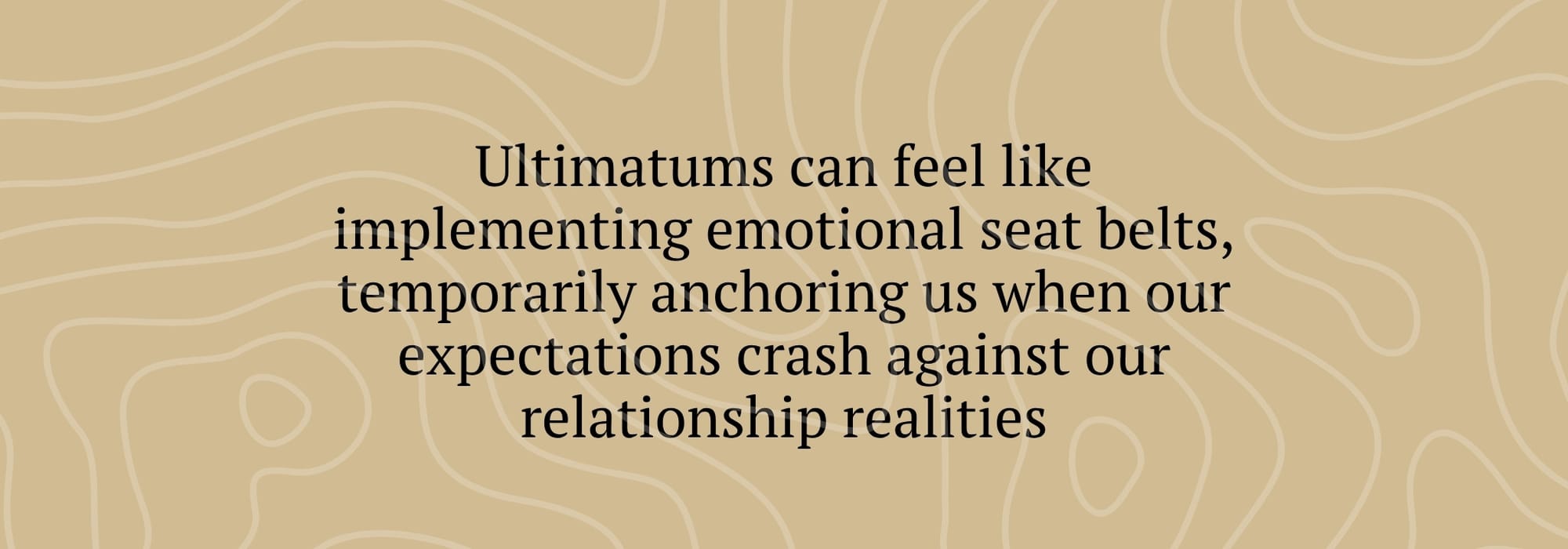We take a deep dive into the ultimatum conundrum
Nobody likes to feel backed into a corner – or like they are reliving the same situation over, and over, and over again. Ultimatums can feel like our final resort, but really, are they ever helpful?
Whether it’s an idea from a Netflix reality show, or advice from well-intentioned friends, many relationship issues can result in feeling like an ultimatum is the only option. Perhaps little things have built up over time, like feeling you’re always late because of your partner, or you’re the one carrying all the emotional labour. Or maybe something big happened to rock your foundations, like infidelity. If you feel like you’ve reached breaking point and something has to change, you might be tempted to offer an ultimatum – something that can have more effects than you may realise.
“We often default to ultimatums when our limbic alarm systems (fight-or-flight) override our prefrontal cortex’s capacity for nuanced negotiation. Simply put, this means we feel emotionally unsafe in our relationships,” says Tina Chummun, a UKCP-accredited therapist, while explaining why we resort to ultimatums.
“Ultimatums can feel like implementing emotional seat belts, temporarily anchoring us when our life context/situation or career feels stalled, our hormones tug at our ticking-clock fears, and our expectations crash against our relationship realities. Yet that black-and-white fixed thinking, which appears demanding, often speaks more about our inner panic than feelings about our true partnership.”

Ultimatums come from a place of desperation. Something has to give. But are ultimatums really the best way to make lasting changes?
Issuing ultimatums v setting boundaries
An ultimatum is essentially a final resort: if your demand isn’t met within a time limit, there will be consequences. A boundary, on the other hand, is about communicating your needs and limits clearly, without trying to control what your partner is doing. Think of it this way: an ultimatum is the final word on a topic where you want to change your partner’s behaviour, whereas setting boundaries is more of a starting point for further discussion and change.
For example, saying something like: “If you don’t stop talking to your ex, I’m breaking up with you” would be an ultimatum – and could risk sounding combative. The same issue could be reframed to set and clarify boundaries without issuing a demand.
Tina recommends opening up the conversation and finding healthy boundaries together. “Try: ‘I notice I feel really anxious and disconnected when I don’t know how often you communicate with your ex. It would help me to understand you more if we agreed on sharing our social interactions, so I can feel safe and secure. Could we find some time and space to discuss what feels respectful to both of us?’ This invites collaboration, honours your emotional attunement, and leverages safe-space two-way dialogue instead of an all-or-nothing demand.”
Can ultimatums ever be healthy in a relationship?
We know that there’s rarely one answer that works across all relationships, but can ultimatums ever really be healthy?
“On small-scale examples – say, for instance, divvying up chores – an ultimatum might spark immediate compliance, satisfying our dopaminergic reward loop. For a much more intense example like infidelity, it’s akin to placing a Band-Aid on a bleeding artery,” Tina explains. “Yes, you might secure a promise on the spot from your partner, for them fearing losing you, and you’ll also store resentment for placing them under immense pressure once the moment has passed. In Netflix’s The Ultimatum: Marry or Move On, many couples secure a ‘yes’, yet months later, the simmering resentment surfaces. So, while ultimatums can trigger short-term change, they seldom cultivate lasting emotional attunement.”
While ultimatums can come from a place of desperation, it’s important to remember that, sometimes, they can become weaponised. Constantly issuing ultimatums can be damaging to a relationship. For those on the receiving end, it can undermine how secure they feel in their relationship. Over time, repeated threats can cause a breakdown in feelings of trust and safety.
“Repeated threats of abandonment weaponise attachment insecurities, and corrode trust, and neurological safety,” Tina explains. “When you say ‘Stop speaking to your ex or else’ over and over again, you’re training your partner’s fear centre. Over time, such tactics can shift neural pathways toward hypervigilance, erode self-worth, and usher in emotional abuse – especially if wielded during vulnerable life transitions when our threat detection is already on high alert.”

How can couples communicate their needs and wants more effectively?
Learning new ways to communicate with our partners can feel daunting, especially when we feel like we’re already trying and aren’t being heard. But there are steps to improve things:
-
Be open and clear. It can be easy to get lost in the moment, or to feel like saying what we really need to say is tough. Ensuring you communicate how you are feeling, what actions and behaviours are affecting you, along with the impact, can be a great starting point to open up new dialogue.
-
Set boundaries. Boundaries can help us to feel happier and more secure both in ourselves and within our relationships, while communicating clearly with our partners about what matters most to us.
-
Save ultimatums as a last resort. If nothing else works, ultimatums can – occasionally – help, depending on the situation.
-
Creating space to check-in each week together about your relationship can be one helpful ritual, Tina recommends, ensuring you focus on both the good (things that bring joy) and the not so good (things you may be worried or upset about). “If it feels too difficult to speak to one another about this, how about writing it down in a journal? Neuroscience shows regular communications surrounding emotional attunement strengthens our prefrontal-amygdala connectivity, reducing reactive ultimatums.”
Incorporating a check-in as part of your regular week can help to create a new tradition moving forward that works for both of you, while strengthening your relationship. “It’s about acknowledging where you both are emotionally in your relationship, accepting each other at the pace that you are each at, and communicating that so that you are both validated with where you both are at, while agreeing to take actions to move forward in your relationship,” Tina adds.
Relearning how to communicate together can be a challenge, but once you start establishing new routines and boundaries to help support and guide the conversation, it can start feeling like you are on the same page. Soon, you’ll feel ready to start making decisions together before things feel out of control.


Comments